10 Annoying Things: Storylines, Devices, Details, etc. Part 2
Here is part 2 of the list of things that irk me in writing. Part 1 can be found here. As always, the list is subjective, my opinion is my own, etc. Well, maybe not completely my own since the list was brought to you by the combined efforts of moi and shirogiku. XD
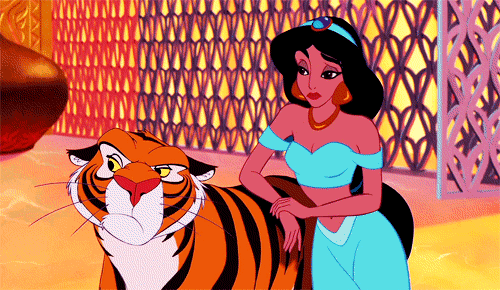
6. Special snowflakes
Having a "special" character in your story is not bad. After all, many classical fantasy stories are built around the "chosen one" trope, and while it is overused, it's all a matter of how it's presented. What irks me personally about "special" characters are the following two moments.
- When the author or the character passionately denies their being special, but the story itself blatantly proves otherwise. I don't mean heroes trying to pass themselves off as regular people. Special snowflakes are usually a step away from becoming Mary Sues (or already there), and their denial looks insincere at best. I always thought false modesty was a rather unbecoming thing. Not to mention, it works both ways. When a relatively normal characters suddenly gets into his/her head that s/he is special (especially if it's not illustrated by the plot and not regarded as one annoying delusion of grandeur), it also sets my teeth on edge.
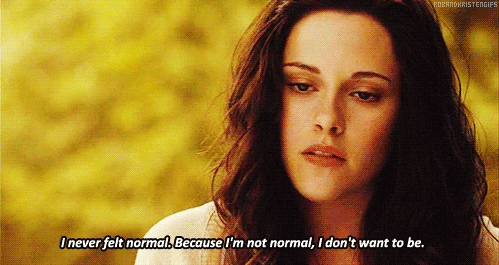
Anyone surprised by the example? XD Hardly. Twilight is arguably not the best source to illustrate things with because let's face it, it has so many issues that it's nearly impossible to find anything that's not an issue there. But I can't think of a clearer example, so. XD In the beginning, it is constantly accentuated how ordinary Bella is - and yet, being a newbie at school, she immediately gains a circle of friends and some guys' attention, which means she can't be that ordinary, at least appearance-wise. It gets worse as she constantly puts herself down comparing herself to Edward who is of course the embodiment of perfection, physical or otherwise. And yet Edward fawns over her because she is arguably special from his POV, at least because he can't read her mind. I don't see anything wrong about people not seeing their own awesomeness and having to be told about it by other people; it can make for quite a touching story of self-discovery. But the focus is never on Bella herself. It's always on her relationship with Edward, which is full of issues as it is, without looking at it through the prism of validating Bella's character. In this light, the quote above, about normality, looks even more ludicrous, because Bella seriously hasn't done anything that special. I may not like Edward very much (or, you know, outright hate him XD), but I have to agree with his attitude towards her becoming a vampire: she can't say there's nothing for her in human life because she hasn't actually lived yet. At times it looks like Meyer is trying to be deep and present Bella's decision as the result of many insecurities about growing old, dying, etc. Which would be understandable given how many times throughout the series Bella's life was in danger. But the fault is in the writing, or in character building, or poor planning (perhaps all of it): what I see is a clingy teenager unwilling to let go of a boy. And if this is not normal in her opinion, I don't know what is.
- Another, more fantasy-related aspect is how conveniently special characters usually fall into the circumstances that demand their presence. Usually, your garden variety special character has lived a normal life for years, but then suddenly something happens, and they meet a group of people in desperate need of something that they conveniently possess, be it a superpower, an artifact, or what have you. More often than not, it's a writing flaw. The author may even explain the situation logically: f.ex. the character's power only manifests at a certain age, and of course the writer wouldn't go into detail about their life before various creepy-crawlies and rebel fighters start noticing them. But more often than not it all seems so abrupt, even with this explanation, especially when a character takes to it like fish to water despite never having had to risk their life before. To me, it just seems very far-fetched.
7. Third party pointing out the character's feelings for each other
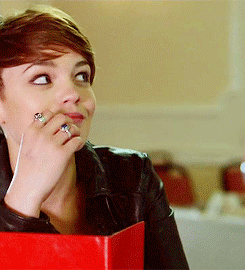
(c) arthurdarvill
Seems like such a small thing, doesn't it? And yet it's one of the most annoying romantic tropes out there. (Note that I'm not going to speak about such things as glorifying abusive relationships here and suchlike - because it's not an annoying thing, it's a freaking big important issue, and this post is of a more light-hearted nature.) Usually because it comes out of nowhere not just from the characters' POV but often from the viewers' and because it is often accompanied by much drama and self-reflection. You wouldn't frequently see such scenes play out like this f.ex.: "Oh, btw, your feelings for each other are glaringly obvious? - We have feelings? Oh, cool." No, there has to be a bucketload of denial, panic, existential angst and re-evaluating the entire universe before finally accepting those feelings.
In Being Human series 5 this is done more than once. Lady Mary dances around this and in the following episode Crumb puts it into words more than once: Hal and Alex like each other. Half the fandom goes "d'awww" at this. The problem with this is that what started as a potentially innocent fling has been blown out of proportion completely: not only does Alex have to ignore the part Hal has played in her death in favour of developing these feelings (which lead to her overlooking all of his crimes entirely after they supposedly become human), but she also conveniently forgets all the crap he's been doing for the past three episodes: recruiting Crumb, lying to Lady Mary, generally acting like a stuck-up asshole - and begins to "admire" and "respect" Hal's efforts to "be something better" (don't even get me started on how I don't see many efforts there, and the fault is once again with the writing, not with Hal himself because I do believe he is at least trying, we're just not shown that very coherently). The first few episodes show virtually no chemistry between Hal and Alex except for the friendly one. Yet episode 4 - no sooner than Crumb brings it up of course - gives us longing looks and Hal's maudlin ruminations on whether or not he can "love" anyone again.
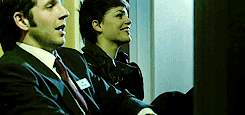
(c) jbaggles
To make matters worse, the character of Sylvie is brought into the matter and painted as a clear parallel to Alex (though to me, she comes off as more of a parallel to Annie because Alex doesn't seem to have enough patience to put up with Hal's indiscretions). Of course Crumb would get all the wrong ideas. Quite often this act of pointing out obvious things is just a device the writers use when they don't know how else to push the characters together.
It can be even worse in longer series when the characters have a luxury of going off the radar completely for a few episodes and then reappearing so in love.
Incidentally there is a quote in Ford Madox Ford's Parade's End about the pressure of society and perhaps fate (if one believes such things) on lovers:
He said: "Damn it all... You were made for him... You can't blame people for coupling you... They're forced to it... If you hadn't existed, they'd have had to invent you... Like Dante for... who was it?.. Beatrice? There are couple like that."
She said:
"Like carpenter's vice... Pushed together. Irresistibly. Haven't we resisted?"
It is a little disturbing in real life when you put it like that, but it's downright annoying in fiction. Unfortunately, this is how most romance is handled (curiously, I have no qualms about Christopher/Valentine in Parade's End despite using this quote as an illustration because their feelings took years to progress, and the feeling of wait does carry across in the novel; not to mention that by the time Mark, Christopher's brother, the man she is speaking to in this quote, point out they're in love, both Christopher and Valentine are already well aware of that and wouldn't think of denying it, at least to each other).
8. Deer/elk/moose as a symbol

Oh, I do realize this is one giant nitpic and YMMV but honestly, aren't there any other symbols? I used to be quite interested in deer. At one point I was even going to write an essay on animal symbolism focusing on deer. The problem is: overused. Again. Usually it's a symbol of purity and innocence, so if you want to show your character's degradation, just have him shoot Bambi. Nick Brody did on Homeland, and that's when we all knew Carrie's suspicions were not unfounded. If you want to foreshadow something scary, have your characters run a deer down. Having read statistics of roadkill in some states, I know it's not uncommon for deer to wander in front of a moving vehicle, but you know what else is not uncommon? Dead cats, dogs, pigeons, rats. Basically anything that lives side by side with humans. But of course the walking symbol of innocence startling you by randomly wandering out of the woods in front of your car is far more symbolic. If you want to create a truly apocalyptic feeling, make your deer evil. I think The Ring 2 (the US version) had some creepy examples of that.
9. Fridging
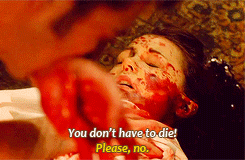
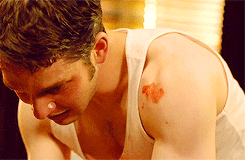
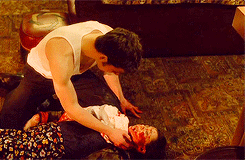
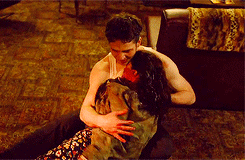
(c) arthurdarvill
Not the most light-hearted one, I know. But doesn't it just get to you how often a character really doesn't have to die but dies to create an impact or to move along the story? I've already mentioned my innumerable issues with Natasha's role in Being Human here, so I won't repeat myself, but at least the poor girl was created to be fridged.
A rather more extreme use of this trope is when a character you haven't seen for a while is brought back in order to be killed off. Hello, SPN.

I've seen some debates concerning the use of the term "fridging", whether or not it should only be applied to characters who die because they are the protagonists' love interests. To be honest, I prefer to use this term loosely, meaning a wasted character. If we use the love interest-oriented definition, then neither Natasha, nor Lenore fit the trope. I don't like to generalize; I think each case should be examined individually, this is why I have a problem with some deaths (Lenore, Sarah Blake, Kara in Merlin) and not the others (Jessica in SPN, Rachel Cutler in BH). It's difficult to explain this even from a purely subjective POV, but neither Jessica, nor Rachel got enough screen time to be real characters as opposed to ideas. They're symbols, and while fanon may expand them into people, they will still remain symbols in canon. Rachel represents the loss of Cutler's innocence; Jessica is Sam's dream of a normal life. This, to me, makes their deaths look tragic and meaningful. Bringing Lenore back 5 seasons after her first - quite intriguing - appearance only to show that life has become unbearable for her and to present her killing as an act of mercy is not only cruel and crude, but also poor writing in my opinion. With Sarah, the whole thing becomes even more unpleasant since she is Sam's former love interest (and quite popular in fandom too). For some reason it is considered that killing women makes more impact. As TV Tropes point out, villains who kill woman are considered to be more evil than those who kill men.
10. Treating women like alien species
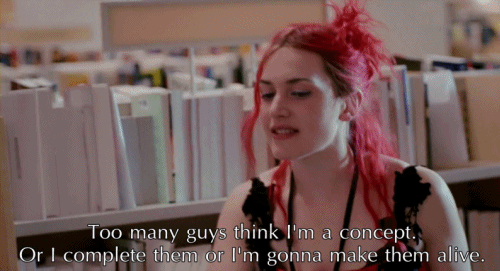
Remember how it was believed in the Middle Ages that a woman has no soul? It seems that now we are trying to compensate for that in fiction by making women too perfect, which usually leads to making them one-sided. A woman is often perceived as more of an idea (which is, as I said above, not always bad if it serves a purpose within the story), but the problem is that we (and I include myself because I used to be quite guilty of that too) cast women in certain roles (whore, virgin, mother, etc.) and seem very surprised when she breaks the mould. For once the problem is not just in the writing but in the way the audiences perceives these stereotypes. A strong woman is supposed to kick ass and have no weaknesses. God forbid a woman who knows kung-fu, can assemble and disassemble a gun with her eyes closed and has saved the world a couple of times acts like a mopey teenager when she has love troubles! In that respect, the writing of, say, Buffy is perfect - but the fandom will always find something to complain about. Buffy is a hero in the field, which surely means she must be a hero in her everyday life too, so the fandom judges her on her one-night stand with Parker because of course it makes her a bit of a slut. Never mind that Buffy never meant for it to be a one-night stand; she and Parker were simply on different wavelength. You wouldn't see people casting men in such iron-clad roles, at least not that often. A man can be a hero, a klutz, a selfish jerk, a gentleman, a scoundrel - and he is allowed to be all of that at once, while a woman isn't most of the time. The fandom's default reaction to Alex from Being Human was largely negative. Why? Because she took it upon herself to flirt with Hal and even suggested a one-night stand. It was stated that Alex hadn't had sex for a whole before that. We were given to understand that she didn't have much of a life outside of looking after her brothers: her mother left when she was 17, she has three little brother and her father is largely inept at looking after the family. Given that I doubt Alex had much time for herself - and the fandom practically labeled her a slut for a bit of innocent flirting. I'm willing to bet that if it had been Hal who'd started it, no one would have paid any attention.
Characters like Alex and Buffy are frowned upon when they act like this. A character like Irene Adler for instance wouldn't be because she is expected to act this way.
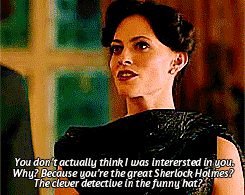
Irene is a strong woman. She is the one with the upper hand. Let's overlook the whole "lesbian in love with a man" issue and focus on the "love" part. A large part of the fandom refuses to accept the fact that Sherlock saved her in the end or that he defeated her (as opposed to book canon) because it somehow makes Irene weak. So what, a strong woman is the one who doesn't feel anything? The one who always wins? People would look excuses, justifying the saving part by this being Irene's victory over Sherlock in the long run, or they would rage at Moffat for building up a strong woman and tearing her down in the last 10 minutes of the episode, forgetting that a well-rounded female character is not supposed to be an automaton. Irene has her weaknesses, but just like Alex and Buffy, she doesn't seem to be allowed to possess them.
The whole issue of female strength is what leads to flame wars most frequently. Who says the only strong women are the ones can punch a man in the face? Game of Thrones, for example, presents a wide array of women, all of them strong in one way or another, but of course if you were to look at the fandom, you would see where people's priorities lie.
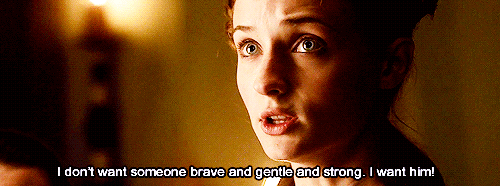
Sansa is not a rebel like her sister Arya. She is not a leader like Daenerys, not a master manipulator like Cersei or Margaery, she's not as wise as Catelyn and not as confident as Ygritte or Shae. But Sansa is strong in her way. She doesn't remain blind to Joffrey's cruelty for that long and her father's death puts an end to any wrong impressions she might have had of him. And yet the fandom continuously puts Sansa down for being weak, whiny, passive, etc. Surviving constant verbal and physical abuse, seeing people die around her and keeping up a facade is one of the most impressive displays of character strength I have ever seen. Try doing that in real life! But in the eyes of many fans Sansa is still a naive little girl who made the mistake of thinking Joffrey was Prince Charming and she would get to have a fairy tale life with him. I've noticed that the part she played in the death of Arya's friend, the butcher's boy, is also something people find hard to forget. It is true that Sansa originally seems to be arrogant, spoilt and selfish - but how many people are not, especially at her age? To point out personality flaws in her is one thing, but to hate her as a character, saying she is poorly written, and to hate her because she is "not Arya" seems ridiculous to me. Of course she is not Arya! Arya already is Arya. The whole idea is to have two completely different Stark sisters. Just because Arya possesses character traits that appeal more to you doesn't mean Sansa is a weak character.
The whole "woman as a person vs an idea" is rooted in life because unfortunately that's how men often view women and that's how women often view themselves. It must be flattering to "save" someone; this is what a lot of abusive relationships are based on. It's more or less bearable when it's clear the character has no other purpose in the story. Then you just give up on them and perceive them as the idea. But when the authors make an effort to present a character as a capable, interesting, smart person - yet somehow completely and utterly blind to how futile and destructive her delusions of "saving" someone can be (particularly when that someone doesn't do anything to facilitate his own "salvation"), it's a waste of a perfectly good character.

The tendency to either elevate a woman beyond all flaws or to bring her down for a number of perfectly realistic responses she displays is frankly alarming. It is even more alarming that however you write a woman, someone is always bound to be displeased. Either you're a sexist, or you're overcompensating for other sexists. It is seldom an issue with men: when you write a man, you just write. You don't pause to think what response this or that action might cause - unless of course the man is dealing with a woman. XD Perhaps we should finally stop expecting the impossible and realize that woman are people, no better or worse than men. Some women like having men to open doors for them, some don't. Some women can have sex with whomever they please and come home to read their kids a bedtime story. It's not an issue when a man does that, but it is when it's a woman. I keep seeing more and more male stereotypes dismantled in fiction: a man can cry, a man can cook and clean, a man can stay with his children. But a woman has to make do with either-or. Honestly, this is getting old.
To sum up these ramblings, let me just refer you to one of my favourite songs, which incidentally shows just how a woman should be written:

6. Special snowflakes
Having a "special" character in your story is not bad. After all, many classical fantasy stories are built around the "chosen one" trope, and while it is overused, it's all a matter of how it's presented. What irks me personally about "special" characters are the following two moments.
- When the author or the character passionately denies their being special, but the story itself blatantly proves otherwise. I don't mean heroes trying to pass themselves off as regular people. Special snowflakes are usually a step away from becoming Mary Sues (or already there), and their denial looks insincere at best. I always thought false modesty was a rather unbecoming thing. Not to mention, it works both ways. When a relatively normal characters suddenly gets into his/her head that s/he is special (especially if it's not illustrated by the plot and not regarded as one annoying delusion of grandeur), it also sets my teeth on edge.

Anyone surprised by the example? XD Hardly. Twilight is arguably not the best source to illustrate things with because let's face it, it has so many issues that it's nearly impossible to find anything that's not an issue there. But I can't think of a clearer example, so. XD In the beginning, it is constantly accentuated how ordinary Bella is - and yet, being a newbie at school, she immediately gains a circle of friends and some guys' attention, which means she can't be that ordinary, at least appearance-wise. It gets worse as she constantly puts herself down comparing herself to Edward who is of course the embodiment of perfection, physical or otherwise. And yet Edward fawns over her because she is arguably special from his POV, at least because he can't read her mind. I don't see anything wrong about people not seeing their own awesomeness and having to be told about it by other people; it can make for quite a touching story of self-discovery. But the focus is never on Bella herself. It's always on her relationship with Edward, which is full of issues as it is, without looking at it through the prism of validating Bella's character. In this light, the quote above, about normality, looks even more ludicrous, because Bella seriously hasn't done anything that special. I may not like Edward very much (or, you know, outright hate him XD), but I have to agree with his attitude towards her becoming a vampire: she can't say there's nothing for her in human life because she hasn't actually lived yet. At times it looks like Meyer is trying to be deep and present Bella's decision as the result of many insecurities about growing old, dying, etc. Which would be understandable given how many times throughout the series Bella's life was in danger. But the fault is in the writing, or in character building, or poor planning (perhaps all of it): what I see is a clingy teenager unwilling to let go of a boy. And if this is not normal in her opinion, I don't know what is.
- Another, more fantasy-related aspect is how conveniently special characters usually fall into the circumstances that demand their presence. Usually, your garden variety special character has lived a normal life for years, but then suddenly something happens, and they meet a group of people in desperate need of something that they conveniently possess, be it a superpower, an artifact, or what have you. More often than not, it's a writing flaw. The author may even explain the situation logically: f.ex. the character's power only manifests at a certain age, and of course the writer wouldn't go into detail about their life before various creepy-crawlies and rebel fighters start noticing them. But more often than not it all seems so abrupt, even with this explanation, especially when a character takes to it like fish to water despite never having had to risk their life before. To me, it just seems very far-fetched.
7. Third party pointing out the character's feelings for each other

(c) arthurdarvill
Seems like such a small thing, doesn't it? And yet it's one of the most annoying romantic tropes out there. (Note that I'm not going to speak about such things as glorifying abusive relationships here and suchlike - because it's not an annoying thing, it's a freaking big important issue, and this post is of a more light-hearted nature.) Usually because it comes out of nowhere not just from the characters' POV but often from the viewers' and because it is often accompanied by much drama and self-reflection. You wouldn't frequently see such scenes play out like this f.ex.: "Oh, btw, your feelings for each other are glaringly obvious? - We have feelings? Oh, cool." No, there has to be a bucketload of denial, panic, existential angst and re-evaluating the entire universe before finally accepting those feelings.
In Being Human series 5 this is done more than once. Lady Mary dances around this and in the following episode Crumb puts it into words more than once: Hal and Alex like each other. Half the fandom goes "d'awww" at this. The problem with this is that what started as a potentially innocent fling has been blown out of proportion completely: not only does Alex have to ignore the part Hal has played in her death in favour of developing these feelings (which lead to her overlooking all of his crimes entirely after they supposedly become human), but she also conveniently forgets all the crap he's been doing for the past three episodes: recruiting Crumb, lying to Lady Mary, generally acting like a stuck-up asshole - and begins to "admire" and "respect" Hal's efforts to "be something better" (don't even get me started on how I don't see many efforts there, and the fault is once again with the writing, not with Hal himself because I do believe he is at least trying, we're just not shown that very coherently). The first few episodes show virtually no chemistry between Hal and Alex except for the friendly one. Yet episode 4 - no sooner than Crumb brings it up of course - gives us longing looks and Hal's maudlin ruminations on whether or not he can "love" anyone again.

(c) jbaggles
To make matters worse, the character of Sylvie is brought into the matter and painted as a clear parallel to Alex (though to me, she comes off as more of a parallel to Annie because Alex doesn't seem to have enough patience to put up with Hal's indiscretions). Of course Crumb would get all the wrong ideas. Quite often this act of pointing out obvious things is just a device the writers use when they don't know how else to push the characters together.
It can be even worse in longer series when the characters have a luxury of going off the radar completely for a few episodes and then reappearing so in love.
Incidentally there is a quote in Ford Madox Ford's Parade's End about the pressure of society and perhaps fate (if one believes such things) on lovers:
He said: "Damn it all... You were made for him... You can't blame people for coupling you... They're forced to it... If you hadn't existed, they'd have had to invent you... Like Dante for... who was it?.. Beatrice? There are couple like that."
She said:
"Like carpenter's vice... Pushed together. Irresistibly. Haven't we resisted?"
It is a little disturbing in real life when you put it like that, but it's downright annoying in fiction. Unfortunately, this is how most romance is handled (curiously, I have no qualms about Christopher/Valentine in Parade's End despite using this quote as an illustration because their feelings took years to progress, and the feeling of wait does carry across in the novel; not to mention that by the time Mark, Christopher's brother, the man she is speaking to in this quote, point out they're in love, both Christopher and Valentine are already well aware of that and wouldn't think of denying it, at least to each other).
8. Deer/elk/moose as a symbol

Oh, I do realize this is one giant nitpic and YMMV but honestly, aren't there any other symbols? I used to be quite interested in deer. At one point I was even going to write an essay on animal symbolism focusing on deer. The problem is: overused. Again. Usually it's a symbol of purity and innocence, so if you want to show your character's degradation, just have him shoot Bambi. Nick Brody did on Homeland, and that's when we all knew Carrie's suspicions were not unfounded. If you want to foreshadow something scary, have your characters run a deer down. Having read statistics of roadkill in some states, I know it's not uncommon for deer to wander in front of a moving vehicle, but you know what else is not uncommon? Dead cats, dogs, pigeons, rats. Basically anything that lives side by side with humans. But of course the walking symbol of innocence startling you by randomly wandering out of the woods in front of your car is far more symbolic. If you want to create a truly apocalyptic feeling, make your deer evil. I think The Ring 2 (the US version) had some creepy examples of that.
9. Fridging




(c) arthurdarvill
Not the most light-hearted one, I know. But doesn't it just get to you how often a character really doesn't have to die but dies to create an impact or to move along the story? I've already mentioned my innumerable issues with Natasha's role in Being Human here, so I won't repeat myself, but at least the poor girl was created to be fridged.
A rather more extreme use of this trope is when a character you haven't seen for a while is brought back in order to be killed off. Hello, SPN.

I've seen some debates concerning the use of the term "fridging", whether or not it should only be applied to characters who die because they are the protagonists' love interests. To be honest, I prefer to use this term loosely, meaning a wasted character. If we use the love interest-oriented definition, then neither Natasha, nor Lenore fit the trope. I don't like to generalize; I think each case should be examined individually, this is why I have a problem with some deaths (Lenore, Sarah Blake, Kara in Merlin) and not the others (Jessica in SPN, Rachel Cutler in BH). It's difficult to explain this even from a purely subjective POV, but neither Jessica, nor Rachel got enough screen time to be real characters as opposed to ideas. They're symbols, and while fanon may expand them into people, they will still remain symbols in canon. Rachel represents the loss of Cutler's innocence; Jessica is Sam's dream of a normal life. This, to me, makes their deaths look tragic and meaningful. Bringing Lenore back 5 seasons after her first - quite intriguing - appearance only to show that life has become unbearable for her and to present her killing as an act of mercy is not only cruel and crude, but also poor writing in my opinion. With Sarah, the whole thing becomes even more unpleasant since she is Sam's former love interest (and quite popular in fandom too). For some reason it is considered that killing women makes more impact. As TV Tropes point out, villains who kill woman are considered to be more evil than those who kill men.
10. Treating women like alien species

Remember how it was believed in the Middle Ages that a woman has no soul? It seems that now we are trying to compensate for that in fiction by making women too perfect, which usually leads to making them one-sided. A woman is often perceived as more of an idea (which is, as I said above, not always bad if it serves a purpose within the story), but the problem is that we (and I include myself because I used to be quite guilty of that too) cast women in certain roles (whore, virgin, mother, etc.) and seem very surprised when she breaks the mould. For once the problem is not just in the writing but in the way the audiences perceives these stereotypes. A strong woman is supposed to kick ass and have no weaknesses. God forbid a woman who knows kung-fu, can assemble and disassemble a gun with her eyes closed and has saved the world a couple of times acts like a mopey teenager when she has love troubles! In that respect, the writing of, say, Buffy is perfect - but the fandom will always find something to complain about. Buffy is a hero in the field, which surely means she must be a hero in her everyday life too, so the fandom judges her on her one-night stand with Parker because of course it makes her a bit of a slut. Never mind that Buffy never meant for it to be a one-night stand; she and Parker were simply on different wavelength. You wouldn't see people casting men in such iron-clad roles, at least not that often. A man can be a hero, a klutz, a selfish jerk, a gentleman, a scoundrel - and he is allowed to be all of that at once, while a woman isn't most of the time. The fandom's default reaction to Alex from Being Human was largely negative. Why? Because she took it upon herself to flirt with Hal and even suggested a one-night stand. It was stated that Alex hadn't had sex for a whole before that. We were given to understand that she didn't have much of a life outside of looking after her brothers: her mother left when she was 17, she has three little brother and her father is largely inept at looking after the family. Given that I doubt Alex had much time for herself - and the fandom practically labeled her a slut for a bit of innocent flirting. I'm willing to bet that if it had been Hal who'd started it, no one would have paid any attention.
Characters like Alex and Buffy are frowned upon when they act like this. A character like Irene Adler for instance wouldn't be because she is expected to act this way.

Irene is a strong woman. She is the one with the upper hand. Let's overlook the whole "lesbian in love with a man" issue and focus on the "love" part. A large part of the fandom refuses to accept the fact that Sherlock saved her in the end or that he defeated her (as opposed to book canon) because it somehow makes Irene weak. So what, a strong woman is the one who doesn't feel anything? The one who always wins? People would look excuses, justifying the saving part by this being Irene's victory over Sherlock in the long run, or they would rage at Moffat for building up a strong woman and tearing her down in the last 10 minutes of the episode, forgetting that a well-rounded female character is not supposed to be an automaton. Irene has her weaknesses, but just like Alex and Buffy, she doesn't seem to be allowed to possess them.
The whole issue of female strength is what leads to flame wars most frequently. Who says the only strong women are the ones can punch a man in the face? Game of Thrones, for example, presents a wide array of women, all of them strong in one way or another, but of course if you were to look at the fandom, you would see where people's priorities lie.

Sansa is not a rebel like her sister Arya. She is not a leader like Daenerys, not a master manipulator like Cersei or Margaery, she's not as wise as Catelyn and not as confident as Ygritte or Shae. But Sansa is strong in her way. She doesn't remain blind to Joffrey's cruelty for that long and her father's death puts an end to any wrong impressions she might have had of him. And yet the fandom continuously puts Sansa down for being weak, whiny, passive, etc. Surviving constant verbal and physical abuse, seeing people die around her and keeping up a facade is one of the most impressive displays of character strength I have ever seen. Try doing that in real life! But in the eyes of many fans Sansa is still a naive little girl who made the mistake of thinking Joffrey was Prince Charming and she would get to have a fairy tale life with him. I've noticed that the part she played in the death of Arya's friend, the butcher's boy, is also something people find hard to forget. It is true that Sansa originally seems to be arrogant, spoilt and selfish - but how many people are not, especially at her age? To point out personality flaws in her is one thing, but to hate her as a character, saying she is poorly written, and to hate her because she is "not Arya" seems ridiculous to me. Of course she is not Arya! Arya already is Arya. The whole idea is to have two completely different Stark sisters. Just because Arya possesses character traits that appeal more to you doesn't mean Sansa is a weak character.
The whole "woman as a person vs an idea" is rooted in life because unfortunately that's how men often view women and that's how women often view themselves. It must be flattering to "save" someone; this is what a lot of abusive relationships are based on. It's more or less bearable when it's clear the character has no other purpose in the story. Then you just give up on them and perceive them as the idea. But when the authors make an effort to present a character as a capable, interesting, smart person - yet somehow completely and utterly blind to how futile and destructive her delusions of "saving" someone can be (particularly when that someone doesn't do anything to facilitate his own "salvation"), it's a waste of a perfectly good character.

The tendency to either elevate a woman beyond all flaws or to bring her down for a number of perfectly realistic responses she displays is frankly alarming. It is even more alarming that however you write a woman, someone is always bound to be displeased. Either you're a sexist, or you're overcompensating for other sexists. It is seldom an issue with men: when you write a man, you just write. You don't pause to think what response this or that action might cause - unless of course the man is dealing with a woman. XD Perhaps we should finally stop expecting the impossible and realize that woman are people, no better or worse than men. Some women like having men to open doors for them, some don't. Some women can have sex with whomever they please and come home to read their kids a bedtime story. It's not an issue when a man does that, but it is when it's a woman. I keep seeing more and more male stereotypes dismantled in fiction: a man can cry, a man can cook and clean, a man can stay with his children. But a woman has to make do with either-or. Honestly, this is getting old.
To sum up these ramblings, let me just refer you to one of my favourite songs, which incidentally shows just how a woman should be written: